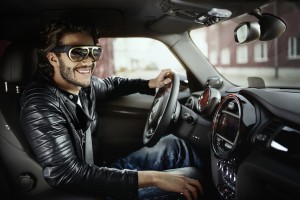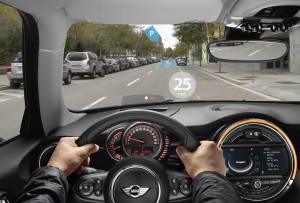
Using see-through technology, the AR eyewear shows relevant information in the driver’s direct field of vision but without concealing other road users.
Head-up displays have been in cars for more than two decades now giving drivers a simple way to see necessary information. The technology, which was borrowed from fighter jets, is supposed to make driving safer.
The technology isn’t widely used because it just hasn’t captured the fancy of U.S. drivers in the same way other advanced options have. However, Mini is offering a new take on it that might make it more appealing with its Augmented Vision glasses.
Instead of throwing information the windshield, the driver wears special augmented reality glasses that are connected to the car, according to the maker. Mini plans to introduce the system at the Shanghai Motor Show this week.
“Mini Augmented Vision gives an insight into how intelligent connectivity between a Mini car and eyewear into which relevant content is projected might work in the future,” explains Dr. Jörg Preißinger, project-manager Mini Augmented Vision, BMW Group research and technology.

Mini's Augmented Vision glasses provide the driver with a wealth of information in a head-up style format.
“Working with several Qualcomm companies, we have created an interlinked system and augmented reality eyewear with a characteristic Mini design that revolutionize the experience both in and outside the vehicle. This prototype with its customized, interactive functions succeeds in fusing augmented reality with the brand’s trademark sense of lifestyle.”
(Mini gets green light for Superleggera convertible. For more, Click Here.)
The glasses, which are a mix of virtual reality goggles and Ray Ban Aviators, shows the driver only several pieces of information using see-through technology without concealing other road users, thereby serving to increase safety and comfort while driving.
(Click Here for details Mini’s new Countryman Park Lane.)
The following functions will be projected into the field of view:
- Destination entry for navigation and transfer to vehicle: Selecting destination points when outside the vehicle, then transferring them to the vehicle.
- First Mile / Last Mile: Navigation display from the current location to the vehicle or from the vehicle to the final destination.
- Head-up display functions: Display of speed, speed limits etc. in the eyewear so the information is in the driver’s primary field of view, with data always shown in same place above steering wheel to make sure that no road users are concealed from sight.
- Contact-analogue navigation and points of interest: Reality is enhanced by contact-analogue navigation arrows “on” the road, as well as display of points of interest along the route, such as open parking spaces. The driver´s attention can always stay focused on the traffic.
- Messaging: A small icon is shown in the eyewear when a message is received. The SMS/message can then be read out by the car while driving for safety.
- 90-X-Ray View / transparent vehicle parts: A virtual view through parts of the vehicle (such as A-pillars and doors) serves to render external areas or objects concealed by the car visible.
- Augmented Parking: This facilitates parking by projecting the images from a camera housed in the (farside) mirror into the eyewear. In this way, the distance from the curb can be clearly and easily ascertained.
The design and color-concept of the eyewear were created by Designworks for Mini while the technical end of the glasses were developed in collaboration with several Qualcomm companies.
(To see more about FCA’s hopes for the new 500X, Click Here.)
“We are proud to have helped develop a breakthrough augmented reality interface between eyewear and the automobile,” says Jay Wright, vice president, Qualcomm Connected Experiences, Inc. “Mini Augmented Vision offers a compelling example of what’s possible today, and what we can expect in the future.”

We already have people operating vehicles who can’t actually drive and chew bubble gum at the same time without having an accident, so now we should give them cellphones and “heads-up display” glasses? I don’t think so. In fact I see the lawyers laughing with glee at this notion as it will make instant millionaires out of many a lawyer.
Heads-up displays were first installed not “nearly two decades ago”, but OVER two decades ago.
Soakee: You are correct. Seems my math was little off. Actually, the first car with a head-up display that I can find was the 1988 Olds Cutlass Supreme. Thanks for catching that for me.